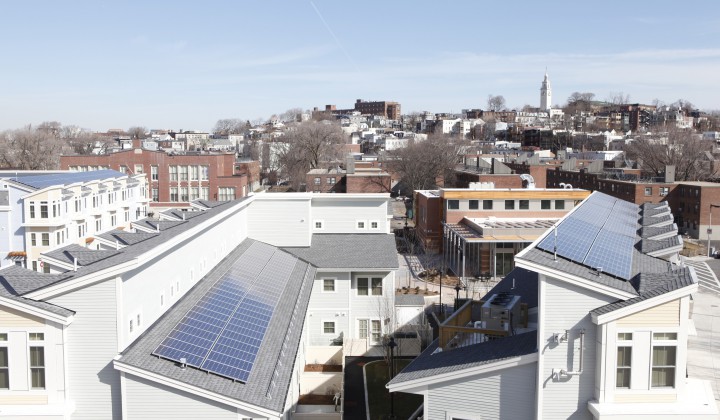Solar power's benefits outweigh its costs

MASSACHUSETTS IS A LEADER in solar power and most experts will tell you that has been a good thing for homeowners, businesses, low income communities, and everyone else who pays for electricity in the state. But unless the Legislature acts soon to preserve and expand the “net metering” caps and the other vital policies that got us here, the cost savings that all of us are enjoying will disappear.
Solar power is a cost-effective solution to our power needs because investments today will reduce everyone’s cost for electricity over time. Not just for people with solar power – for everyone. According to an analysis conducted for the state Legislature-appointed Net Metering and Solar Task Force, solar power delivers benefits to the people of Massachusetts that are worth more than twice as much money as it costs. A $2.77 return for every $1 invested.
How? First of all, adding more solar to our electric grid lowers generation costs for everyone– not just for those who actually have the solar panels on their roofs. That’s because right now, nearly all of the high cost of electricity in Massachusetts is caused by over-reliance on natural gas, which has to come from out of state. When the utilities and power companies need to create lots of power — especially during hot summer days when air conditioners are running — they have to buy more natural gas and start up inefficient (and polluting) oil-fueled power plants. Supply and demand pushes the cost of generating power higher and higher, and rates climb for all of us. Last winter, customer rates for electricity climbed a frightening 40 percent.
But sunlight is always free. And sunlight is most plentiful during those same peak-demand summer days. So having more solar power available reduces the demand for fossil fuel generated power, which means less money needed to buy gas and oil – and the rates go down for everyone.
Second, solar power is also helping lower the amount of money we all have to spend on our electricity bills for updates to the power infrastructure. By adding on-site power generation, solar owners are reducing demands on the grid. This reduced wear and tear translates to less money needed to replace power lines and transformers. Also, between now and 2020, New England is expected to lose a third of its existing generating capacity as old, dirty fossil-fuel-fired power plants are retired. Ratepayers are going to pay – one way or another – to replace that power-generating capacity. Adding more solar to the grid helps bring a portion of that needed new power online now in the fastest, most efficient and cleanest way.
Third, the incredible growth in our state’s solar power, from just 10 megawatts (MW) in 2009 to a very impressive 852 MW today, has been fueled by the growth of a local solar workforce. Solar power represents a $2.3 billion investment in our local economy and solar power supports more than 12,000 jobs in our state. Every dollar invested in solar power creates $1.20 in benefits to the local economy. The alternative is to send $22 billion of our money out of Massachusetts every year to purchase coal, oil and gas.
Combined, solar power ends up benefiting ratepayers far more than it costs. The task force analysis said the benefits of Massachusetts solar investments could total $8.8 billion over the next 25 years, with a significant chunk of that benefit going to people who have never even considered installing their own solar power. But the benefits of solar power will quickly start to slip away if the Legislature makes the wrong choices in the current debate on solar policy.
Solar power has succeeded in Massachusetts because it’s been widely accessible, and key to this are two provisions: “net metering,” which gives customers with solar panels fair credit for the excess energy they return to the grid; and “virtual net metering,” which allows net metering credits to be shared, bought, or sold to different customers. Together these two provisions provide the flexibility needed for the 80 percent of us who want to be part of the solar revolution but either don’t have our own sunny rooftop or can’t afford the up-front costs of a solar installation.
The Legislature needs to act quickly to keep these valuable provisions working. Net metering caps have already stalled solar projects in more than half the state. On hold are countless projects like the 995 kW solar installation Sterling Manufacturing has planned in Lancaster. Solar workers have started losing their jobs and our robust, nation-leading solar industry is scrambling to develop projects in other states during the uncertainty.
Our current policies have made it possible for middle-class families, low-income communities, non-profits, and businesses of all sizes to gain access to solar power. It’s meant a healthier state, a stronger economy and a brighter future – literally – for our communities. The Legislature should lift the net metering caps and expand these programs so solar power continues to be accessible to all.
Elyse Cherry is the CEO of Boston Community Capital, a non-profit community development financial institution dedicated to helping build healthier communities where low-income people live and work.
Tedd Saunders is the CSO of the Saunders Hotel Group, a fourth generation family business headquartered in Boston’s Back Bay at their historic, four-star flagship, The Lenox.
This opinion piece originally appeared online in CommonWealth Magazine.


